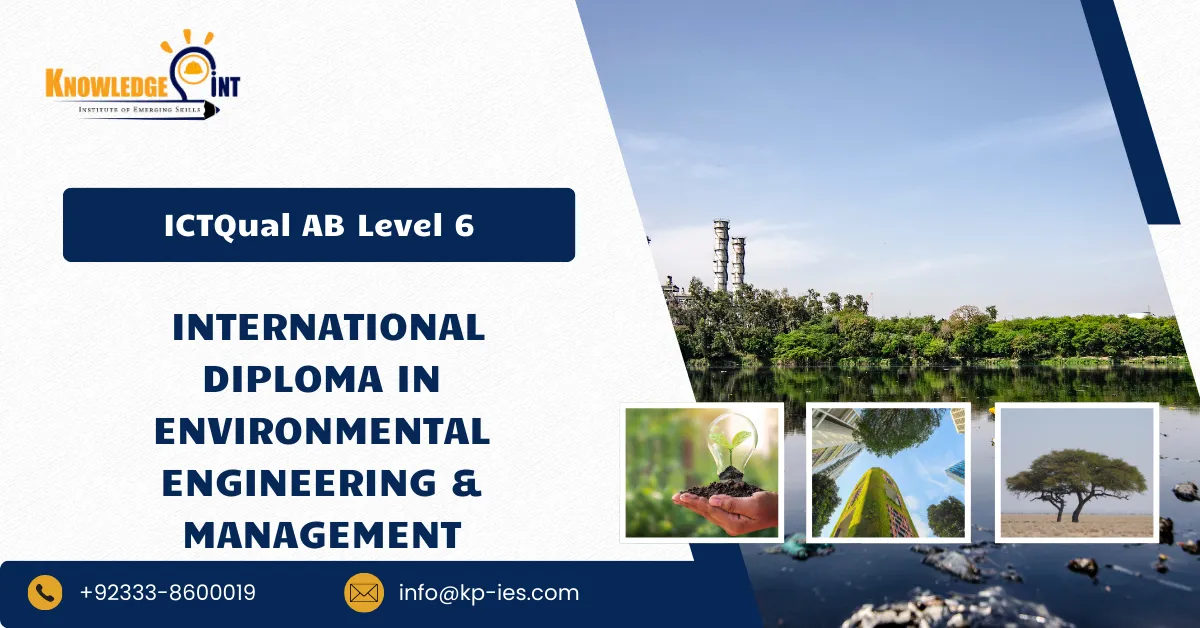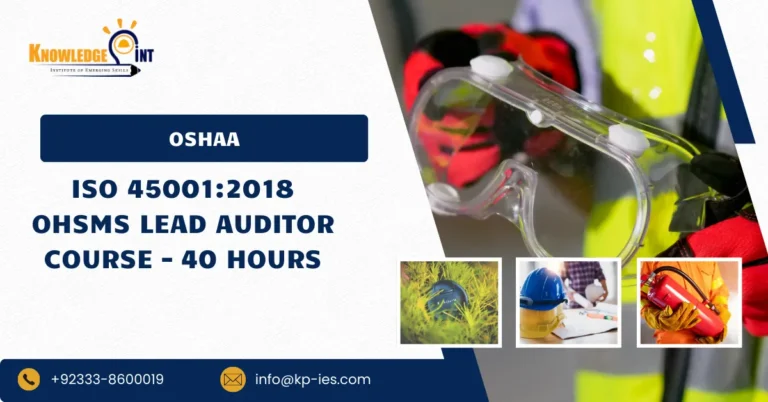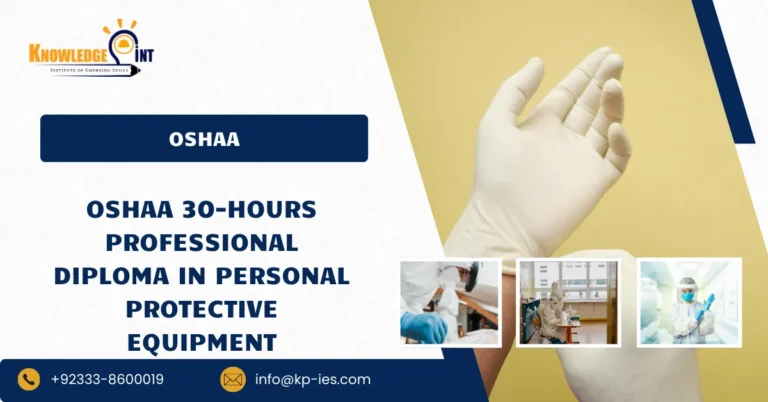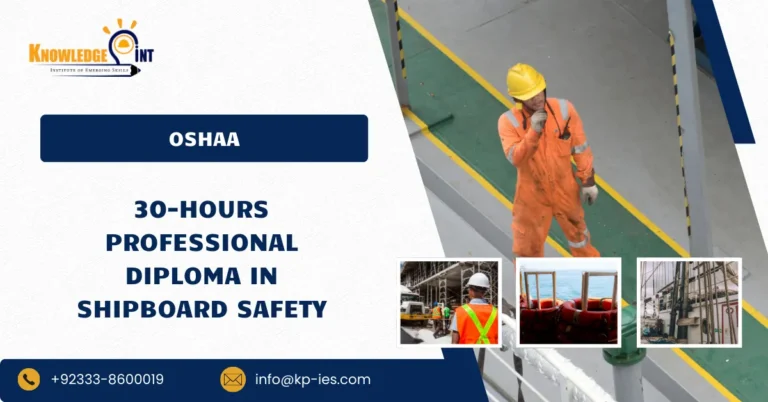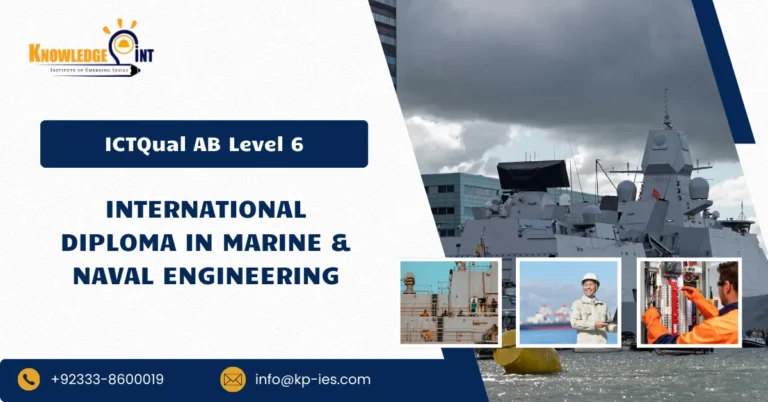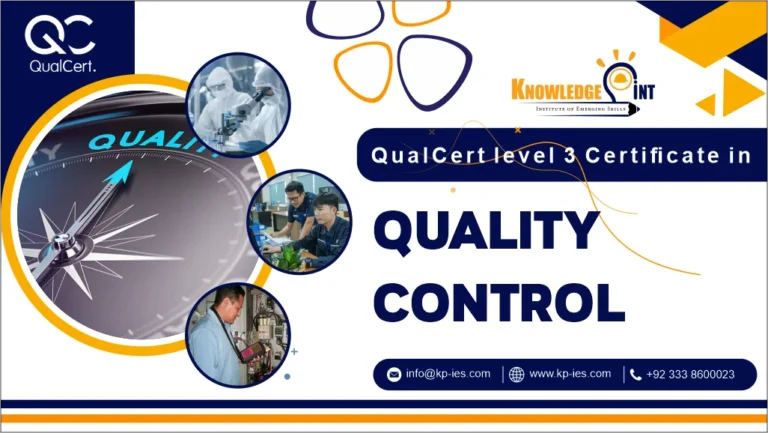The ICTQual AB Level 6 International Diploma in Environmental Engineering & Management is a comprehensive three-year, 360-credit programme designed to equip learners with advanced knowledge and practical skills in environmental engineering, sustainable development, and management practices. This qualification addresses the growing global demand for professionals capable of implementing environmentally responsible engineering solutions, ensuring regulatory compliance, and promoting sustainability across industrial and urban environments.
Learners will gain expertise in areas such as environmental impact assessment, waste and resource management, water and air quality control, renewable energy systems, and sustainable project planning. The course integrates technical engineering knowledge with strategic management practices, empowering learners to design, implement, and monitor sustainable environmental solutions within organisations.
This programme is suitable for both fresh learners who are beginning their careers in environmental engineering and experienced professionals seeking formal recognition of their skills and competence. Fresh learners will develop a solid foundation in environmental science, engineering principles, and regulatory frameworks, progressing to applied and strategic management skills over the three years. Experienced learners can leverage their professional background to enhance their understanding of complex environmental challenges and leadership in sustainability initiatives.
Course Overview
This qualification, the ICTQual AB Level 6 International Diploma in Environmental Engineering & Management, consists of 36 mandatory units.
Year 1 – Foundation of Environmental Engineering & Management
- Principles of Environmental Engineering
- Introduction to Environmental Science and Sustainability
- Environmental Legislation and Regulatory Compliance
- Environmental Impact Assessment (EIA) Fundamentals
- Waste Management and Pollution Control
- Water Quality Management and Treatment
- Air Quality Monitoring and Control
- Soil and Groundwater Protection
- Renewable Energy Systems and Applications
- Occupational Health, Safety, and Environmental Awareness
- Communication and Reporting in Environmental Management
- Professional Ethics and Responsibility in Environmental Practice
Year 2 – Applied Environmental Engineering & Management
- Advanced Environmental Risk Assessment
- Industrial Wastewater and Effluent Management
- Solid and Hazardous Waste Engineering
- Environmental Monitoring and Audit Techniques
- Sustainable Resource Management and Conservation
- Climate Change Mitigation and Adaptation Strategies
- Environmental Modelling and Data Analysis
- Green Building and Sustainable Infrastructure
- Environmental Management in Manufacturing and Energy Sectors
- Behavioural and Organisational Approaches to Environmental Safety
- Digital Tools and Technologies in Environmental Engineering
- Research Methods and Environmental Project Planning
Year 3 – Strategic Environmental Leadership & Management
- Strategic Environmental Management and Governance
- Integrated Environmental Management Systems (ISO 14001, ISO 50001)
- Environmental Policy Development and Implementation
- Sustainability Leadership and Corporate Social Responsibility (CSR)
- Environmental Risk Management in Large-Scale Projects
- Renewable Energy Project Management
- International Environmental Standards and Best Practices
- Environmental Innovation and Emerging Technologies
- Environmental Crisis Management and Emergency Planning
- Advanced Occupational Health & Environmental Wellbeing Strategies
- Independent Research Project in Environmental Engineering
- Capstone Project: Applied Environmental Engineering & Management
Learning Outcomes for the ICTQual AB Level 6 International Diploma in Environmental Engineering & Management 360 Credits – Three Years:
Year 1 – Foundation of Environmental Engineering & Management
1. Principles of Environmental Engineering
- Explain the core concepts and principles of environmental engineering.
- Analyse engineering solutions to address environmental challenges.
2. Introduction to Environmental Science and Sustainability
- Describe fundamental environmental science concepts.
- Evaluate sustainability principles in industrial and urban contexts.
3. Environmental Legislation and Regulatory Compliance
- Interpret key environmental laws, regulations, and standards.
- Assess organisational compliance with legal requirements.
4. Environmental Impact Assessment (EIA) Fundamentals
- Conduct basic environmental impact assessments.
- Identify environmental risks and propose mitigation strategies.
5. Waste Management and Pollution Control
- Examine techniques for managing solid, liquid, and hazardous waste.
- Recommend methods to reduce environmental pollution.
6. Water Quality Management and Treatment
- Monitor and analyse water quality parameters.
- Apply treatment processes to maintain safe water standards.
7. Air Quality Monitoring and Control
- Identify major air pollutants and their sources.
- Develop strategies to monitor and control air quality in industrial settings.
8. Soil and Groundwater Protection
- Assess risks to soil and groundwater resources.
- Recommend protection and remediation measures.
9. Renewable Energy Systems and Applications
- Explain the principles of renewable energy technologies.
- Evaluate their application in reducing environmental impact.
10. Occupational Health, Safety, and Environmental Awareness
- Identify workplace environmental and safety hazards.
- Apply preventive measures to maintain a safe work environment.
11. Communication and Reporting in Environmental Management
- Produce clear reports and documentation for environmental compliance.
- Communicate technical information effectively to stakeholders.
12. Professional Ethics and Responsibility in Environmental Practice
- Apply ethical principles in environmental engineering decisions.
- Demonstrate professional responsibility in project implementation.
Year 2 – Applied Environmental Engineering & Management
1. Advanced Environmental Risk Assessment
- Conduct comprehensive environmental risk assessments.
- Develop risk mitigation plans for complex industrial processes.
2. Industrial Wastewater and Effluent Management
- Analyse industrial wastewater characteristics.
- Design and evaluate treatment systems to meet environmental standards.
3. Solid and Hazardous Waste Engineering
- Implement engineering solutions for hazardous and solid waste management.
- Ensure compliance with environmental regulations.
4. Environmental Monitoring and Audit Techniques
- Design monitoring programmes for air, water, and soil quality.
- Conduct environmental audits and assess organisational performance.
5. Sustainable Resource Management and Conservation
- Evaluate strategies for efficient resource utilisation.
- Develop plans to conserve natural resources in industrial operations.
6. Climate Change Mitigation and Adaptation Strategies
- Analyse climate change impacts on industrial and urban environments.
- Design strategies to mitigate and adapt to climate-related risks.
7. Environmental Modelling and Data Analysis
- Apply quantitative techniques to model environmental systems.
- Interpret data to inform decision-making and project planning.
8. Green Building and Sustainable Infrastructure
- Evaluate sustainable design principles for buildings and infrastructure.
- Apply environmental engineering solutions to reduce ecological impact.
9. Environmental Management in Manufacturing and Energy Sectors
- Identify environmental risks in manufacturing and energy production.
- Implement sector-specific environmental management practices.
10. Behavioural and Organisational Approaches to Environmental Safety
- Analyse human factors influencing environmental compliance.
- Develop strategies to promote a positive environmental culture.
11. Digital Tools and Technologies in Environmental Engineering
- Utilise software and digital tools for environmental monitoring and management.
- Assess technological solutions for environmental problem-solving.
12. Research Methods and Environmental Project Planning
- Design and plan environmental projects using scientific research methods.
- Analyse project data to support effective decision-making.
Year 3 – Strategic Environmental Leadership & Management
1. Strategic Environmental Management and Governance
- Lead environmental management initiatives at an organisational level.
- Develop governance structures to ensure sustainability and compliance.
2. Integrated Environmental Management Systems (ISO 14001, ISO 50001)
- Apply integrated management systems to enhance environmental performance.
- Evaluate compliance with international environmental standards.
3. Environmental Policy Development and Implementation
- Formulate and implement organisational environmental policies.
- Assess the effectiveness of policies in achieving sustainability goals.
4. Sustainability Leadership and Corporate Social Responsibility (CSR)
- Promote sustainability through leadership and ethical practice.
- Integrate CSR strategies into organisational environmental planning.
5. Environmental Risk Management in Large-Scale Projects
- Identify and manage environmental risks in complex projects.
- Develop mitigation and monitoring strategies for project success.
6. Renewable Energy Project Management
- Plan and manage renewable energy projects within industrial contexts.
- Evaluate environmental and economic impacts of renewable solutions.
7. International Environmental Standards and Best Practices
- Analyse global environmental standards and frameworks.
- Implement best practices to ensure international compliance.
8. Environmental Innovation and Emerging Technologies
- Assess innovative technologies for environmental improvement.
- Apply emerging solutions to solve complex environmental challenges.
9. Environmental Crisis Management and Emergency Planning
- Develop emergency response strategies for environmental incidents.
- Coordinate crisis management activities to minimise environmental impact.
10. Advanced Occupational Health & Environmental Wellbeing Strategies
- Design programmes promoting environmental health and wellbeing.
- Integrate wellbeing initiatives into organisational practices.
11. Independent Research Project in Environmental Engineering
- Conduct independent research on a relevant environmental topic.
- Analyse findings and provide evidence-based recommendations.
12. Capstone Project: Applied Environmental Engineering & Management
- Plan and execute a comprehensive applied environmental engineering project.
- Demonstrate integration of technical knowledge, management skills, and strategic leadership.
Course Benefits of ICTQual AB Level 6 International Diploma in Environmental Engineering & Management
- Provides comprehensive knowledge of environmental engineering principles, sustainability, and management practices.
- Equips learners with skills in environmental impact assessment, pollution control, and waste management.
- Develops expertise in designing sustainable infrastructure, water treatment systems, and renewable energy solutions.
- Enhances understanding of environmental laws, regulations, and international sustainability standards.
- Offers practical experience through field studies, laboratory work, and real-world environmental projects.
- Strengthens problem-solving, analytical, and decision-making skills for sustainable engineering solutions.
- Prepares learners for leadership and management roles in environmental engineering, consultancy, and sustainability projects.
- Improves employability in environmental consultancy, government agencies, renewable energy, and industrial sectors.
- Promotes adherence to ethical practices, environmental stewardship, and corporate social responsibility.
- Supports continuous professional development and specialization in advanced environmental engineering technologies and sustainability practices.
After completing this course, learners can progress in the following ways:
- Pursue Master’s degrees in Environmental Engineering, Environmental Management, Sustainability, or Renewable Energy.
- Obtain professional certifications such as Certified Environmental Engineer, ISO 14001 Lead Auditor, or Sustainability Management Professional.
- Advance into senior roles such as Environmental Engineer, Sustainability Consultant, Project Manager, or Environmental Compliance Officer.
- Work with government environmental agencies, consultancy firms, construction and industrial companies, and renewable energy organizations.
- Progress into leadership and executive positions, managing environmental projects, sustainability programs, and compliance initiatives.
- Engage in research and innovation, developing sustainable technologies, pollution reduction methods, and green infrastructure solutions.
- Transition into specialized areas such as water resources management, environmental impact assessment, climate change mitigation, or waste-to-energy projects.

